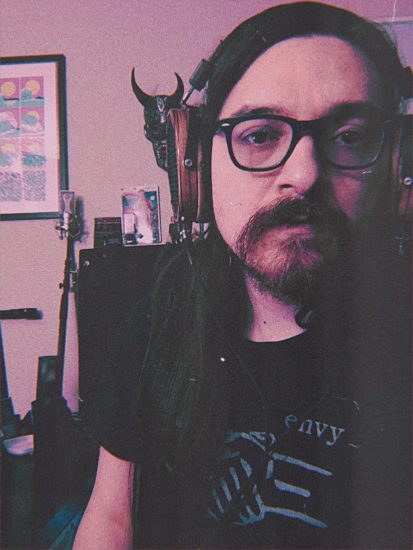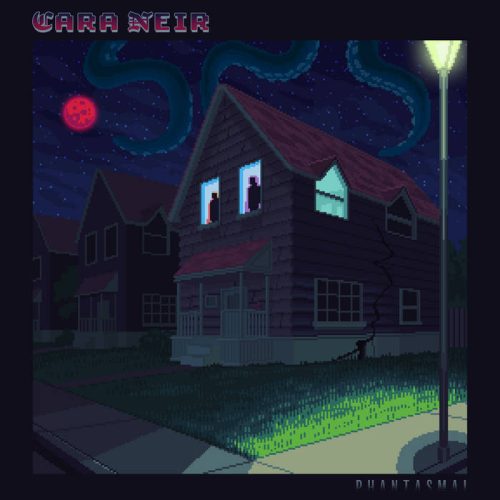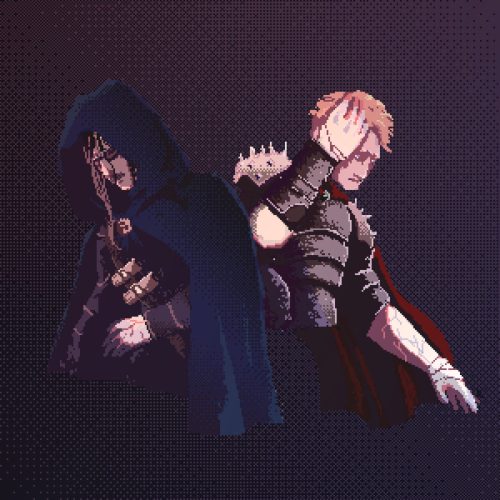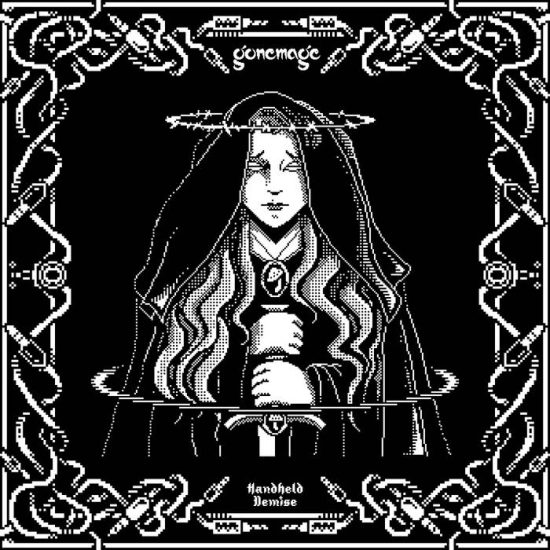
(Today we present an extensive article by Rob Tamplin that’s part interview with Garry Brents of Cara Neir and Gonemage, and part essay on the fantasy worlds that have taken shape through those projects and the techniques used to bring them to life, along with some meditations on the pluses and minuses of nostalgia.)
If I was reluctant to say Cara Neir is the most exciting band in the US metal underground, it’s only because that would mean putting them in a box. Hell, even the word “band” seems like a loose fit, as there is a communal element to the Texas duo absent from most acts.
On Phantasmal, Garry Brents and Chris Francis’s eighth album together, Cara Neir debut five characters submitted by fans via their Bandcamp page. Over the course of the album, the duo encounters these characters on their quest through a horrifying alternate dimension.
See, Phantasmal is a concept album – just like Tommy or Jeff Wayne’s War of the Worlds. Although it’s about as far from a pompous rock opera as it’s possible to get. The music, which broadly ranges from noise-rock to electronic powerviolence, is glazed with a frosting of rudimentary 8-bit synths, the kind you last heard when you were playing Castlevania at the arcade in your matching acid-wash denim two-piece, cramming the Dungeon Master’s Guide while blasting Master of Puppets on your Walkman. Which could have been today. It’s 2022, you could be doing some, or all, of those things while reading this.

Cara Neir find themselves poised at the apex of popular culture, a culture obsessed with legendary heroes and multiverses.
After a slithering minimalist intro (entitled ‘Menu’), ‘Melted Candle’ kicks things off with a Sonic Youth lurch. “We don’t know how we got here,” sings lyricist and vocalist Chris Francis in a distorted rasp. “This can only be another test, but what we have will only get us so far.”
This isn’t the first time Cara Neir have encountered a nightmare realm like this one. Phantasmal is the second in Cara Neir’s trilogy of roleplaying game-themed albums. The previous, 2021’s Phase Out, depicted the duo transported to a similar game world by intergalactic dimension-hopping villain The One From Trimjrtle. This time, they’re trapped in the world of Japanese RPGs, which have a distinct flavour from their Western counterparts.
If by now you have a lot of questions, rest assured so did I. Cara Neir’s composer and instrumentalist Garry Brents was kind enough to answer them for me.

Rob Tampling: So why did Cara Neir decide to use 8-bit sounds in the Phase Out trilogy?
Garry Brents: Almost purely out of nostalgia, but also putting a puzzle together. I think part of it was my own nostalgia for ‘90s RPGs, pixel art and games, showcasing what I love – maybe others will find that interesting.
The element of puzzle is significant to the world of Cara Neir and, now more than ever, the world as a whole. Over lockdown, the popularity of roleplaying games spiked. They offered entertainment, comfort and company to a bored, frightened and isolated population. Hasbro reported in 2020 that sales of Dungeons & Dragons had jumped by a third. Helped, no doubt, by another lockdown staple.
Phantasmal’s cover artwork might seem familiar to anyone with a Netflix subscription. It depicts a colonial-style suburban house, lovingly rendered in pixel art. A red moon hovers above, and Lovecraftian tentacles curl from the night sky. The doomed house is cracking in half like The House of Usher. The whole image is a perfect distillation of the urban fantasy horror evoked by Stranger Things.
RT: I’m curious to know what you think about Stranger Things and the recent upsurge in geek culture.
GB: I’ve only watched the first two seasons and, while I did enjoy it, I didn’t feel compelled to vigilantly keep up. I appreciate the upsurge and revivalist tendency in geek culture. It may give someone a chance to check out something they never knew about when they were younger.
RT: As well as evoking early ‘90s games, you’re also releasing your music on vintage formats like LP and tapes. What relationship does the Phase Out trilogy have to the nostalgia industry?
GB: A very symbiotic relationship. These formats and nostalgic art styles truly complete the circle for the whole concept of these albums.
Nostalgia is a coping mechanism for a a hostile present. Is it any wonder that the ‘80s and ‘90s are rolling around again in all their polyester glory? Stranger Things is just one example of current pop culture evoking itself circa ‘87-‘95. Mom jeans, lightning-bolt guitars, Pose, Future Nostalgia. And if this sounds like the ranting of an embittered elder millennial, I actually have receipts.
It’s all thanks to the twenty-year rule. The Strauss–Howe theory says that historical events bring with them recurring cultural archetypes. The American authors’ 1991 book Generations is about the generation gap between Boomers and their parents. Basically, every couple of decades a new generation stamps its identity all over the culture, an identity forged by popular culture twenty to thirty years prior.
What this means for us right now is that the end of history is back, and it’s pissed.

But the internet has long since turned rock stars from unreachable cultural monoliths into just another bunch of people with socials. Cara Neir embraces the audience’s current ease of access, taking full advantage of the web’s communal potential. In order to fund the vinyl print of Phase Out, Cara Neir set up a Bandcamp campaign, where fans could pledge money to fund the LP in return for rewards.
Bandcamp’s platform is unique because of the level of interactivity it offers. It’s a music streaming website and community, stopping just short of being a full-blown social media. This allows for a lot more communication, and storytelling, than your common-or-garden streaming service.
We live in the age of content. Music fans expect extras, and this is an area in which Cara Neir excel.
The band’s 2021 vinyl campaign offered five pledgers the chance to submit characters for Phantasmal. When they exceeded their goal, true to their word, Cara Neir worked Millius, Arthur Frost, Captain Ishmael, Designation: YLB, and Milefecerium into the album’s narrative. Pixel art portraits of the characters are included with the album, and they’re also described in detail on the album’s ‘about’ page, which also features lyrics and a summary of the story.
******
RT: How integral is Bandcamp’s platform to Cara Neir?
GB: Bandcamp is crucial for us. The most important platform, I’d say. Not only does the nature of the platform allow the band to, basically, sell creative space in their songs, but it allows for a close connection between artist and fan. It’s also the place where most of our fans stay up-to-date by way of the community function.
RT: How did incorporating fans’ ideas and characters affect writing the record?
GB: It was really fun getting to incorporate these characters into Phantasmal! It felt like a breath of fresh air to have a directive that we promised to adhere to. I like to break rules and branch out, and having a guideline helped rein in the focus for us to write around.
RT: Does the communal aspect of Cara Neir stretch beyond Bandcamp?
GB: There’s a little bit of interaction on Twitter and Instagram. However, I would say I use those platforms more for my Gonemage project, in terms of teasing new audio, giving prompts to fans for future album ideas, etc.

Ah yes, Gonemage. That’s another thing.
Garry’s creative drive doesn’t just stop at the uncommonly prolific Cara Neir. Late last month Garry released Handheld Demise, his fourth solo album as Gonemage, whose songs merge black metal and chiptune, and whose lyrics are set in an alternate reality from the Phase Out universe. Gonemage is an even more communal narrative music project, which also finds its home on Bandcamp.
******
GB: Handheld Demise is mostly inspired by recurring nightmares that fans, and even strangers, submitted. Like a monster of the week format.
RT: What’s it like to write dungeon-crawler-style lyrics from your own point of view?
GB: It’s incredibly fun. Chris had a great time putting the lyrics to Phantasmal. For Gonemage, the 8-bit and RPG-like elements are still a focal point. It’s a little humorous at times, trying to be clever with certain rhyming schemes. I transport myself into those fantasy worlds while I’m trying to come up with lyrics.
******
So that’s two albums Garry’s had out in 2022. Oh, no wait, there’s also 77 Myths of Venerable Magik, a 77-song split album by Cara Neir and fellow Texan noisecore wizards Infernal Legions of Mordor. Plus Life’s Wishes to Tears, his full-length grindcore album as Homeskin.
Come on reader, keep up! If you can follow the Marvel cinematic universe, the various current Star Treks or the Whoniverse, this should be a doddle.
Last year, Cara Neir released two full-lengths (including Pain Gel of Purification, an album of 16 songs which comprises “an assortment of satire, product placement, service industry grievances, a lot of blasting, and more”) and one EP – a chiptune soundtrack to the 8-bit game of Phase Out. Garry also released the incredible Stasis Cocoon LP, the final album by Sallow Moth, his former technical death metal project. Sallow Moth also had its own extensive lore, again thoughtfully reproduced on the album’s Bandcamp.
Those are just a few of the projects Garry has worked on in the past 24 months. And he does all this while working a full-time job.
******
GB: I definitely have a strong creative drive that feels more like a need most of the time. It comes from my mind wandering a lot, wanting to tap into my different tastes in music. Like putting fun puzzles together.
RT: Both Sallow Moth and Phase Out’s lore is exceptionally well developed. Where did your knack for storytelling and worldbuilding come from?
GB: A lot of it has to do with growing up playing tabletop RPGs like Dungeons & Dragons with my older cousins. It was the early ’90s, I was maybe six or seven, and we’d get together for a weekend stretch, or a couple weeks even. They’d let me be the Dungeon Master. It was fun being able to direct where and when things would happen in a campaign. That must have been the catalyst for cultivating storytelling and driving my imagination into worldbuilding. Throughout the years, art projects in school that revolved around worldbuilding really strengthened it. It was only a matter of time until I incorporated that into my music.
RT: As far as I can tell, RPG has a somewhat woolly definition. I understand it as a story, told between two or more people, modulated by various rules and game mechanics. I’m interested in your definition.
GB: A game, usually focused on adventure and exploring, where you’re playing as a character, or group of characters, to advance their characterization and the story.
It’s at this point that something clicks. If RPG is an act of adventure storytelling with input from a group of players, then surely the Phase Out trilogy itself is a set of RPG titles, created in real time!
GB: Essentially, yes!
******
If this all sounds a bit high concept, then worry not, because Cara Neir rock the fuck out. Also, crucially, they know how to edit. Phantasmal is a brisk half hour of savage prog punk which never stays in the same lane for long. Its horizon-wide sound palette benefits from a crisp production job, and a mix that serves every instrument across the board.
‘The Threshold’ starts off with a blast of hardcore punk before lapsing into synths which evoke latter-day Radiohead. Then a blast of chiptune chaos sees the rest of the song play out like one of Mr Bungle’s worst nightmares. ‘No Escape From’ is all witch house ambience and clanging bass, before a chunky electro blastbeat cuts the song in two. It never recovers, turning into swirling spectral cobwebs of ambient moans until it crackles to a halt. Final track ‘Throttled Into Decay’ starts with a woozy, jazzy verse which is served notice by an upbeat post-rock chorus, like Do Make Say Think got into Napalm Death instead of Can. Then a vaporwave-ish digital saxaphone solo gives way to a raucous Oi! Punk climax.
The end of Phantasmal sees Cara Neir “warping… out of this dimension and into one we have no past of.” The game isn’t over yet – there’s still the small matter of album three to come.
******
RT: Will the lore of Phase Out continue beyond album three?
GB: It won’t. We’ve spoken about the third piece, solidifying the end of it, which will most likely incorporate some unexpected turns!
RT: What are your ambitions for the Phase Out universe post-album three?
GB: There’s nothing set in stone. However, I do have plans for some characters from that universe to cross realities into the Gonemage universe.
******
And from what we have on Handheld Demise, there’s plenty of plot left to unravel in the ever-expanding musical multiverse(s) of Garry Brents.
A patina is the multitude of streaks, gouges and nicks that objects pick up over time – the physical embodiment of use. Anthropologist Grant McCracken said that this term had symbolic applications too.
In coating their music in 8-bit sounds, in wrapping it in glorious pixel art, in channelling their inner seven-year-old Dungeon Masters, Cara Neir seek to bottle the patina of time.
Objects we know from childhood – like a vintage cassette tape with a kickass metal album on it – appeal to us in ways new objects just can’t. The rush of positive associations when we hold something from our childhood is nostalgia incarnate.
Of course, ‘object’ can mean anything – a tape, a film, a game, an opinion, an idea. I’m curious to know one more thing about Cara Neir and their relationship with the nostalgia industry.
******
RT: I’m wondering what you think about the potential dangers of nostalgia, given that right-wing movements like Brexit and MAGA look back to a more ‘idyllic’ time, while stirring up dissatisfaction with more progressive, present attitudes. How do we find comfort in the past without going back to less enlightened times?
GB: I think there’s a connection there, and there is a potential danger in that thinking, because it’s already sewn in those individuals – nothing shaking them. The danger is of course the impression it makes on the youth, whose minds are still soaking in information and developing worldviews.
I think the way we find comfort in the past is asking, “does this nostalgic thing that people enjoyed and revered add anything of value today? If it doesn’t, why not, and can we learn from it and move forward?”
